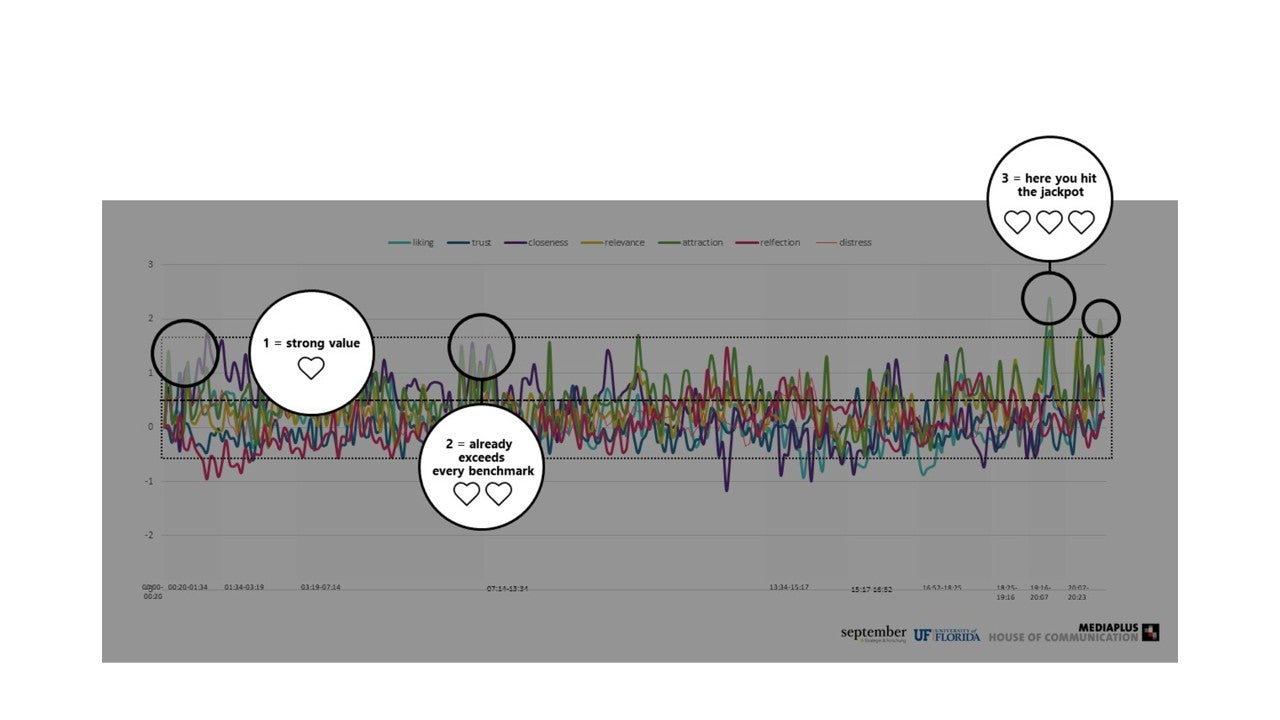
The Secret Podcast Code
What are the factors that determine a podcast’s success? This is what a study by the Mediaplus Group, september Strategie & Forschung and the University of Florida has discovered.
Podcasts generally create intimacy, and intimacy is good for brand communication – as the “Secret Podcast Code” study shows, this is true only to a limited degree. Using a multi-phase, qualitative and quantitative study design, the Mediaplus Group and its research partners – september Strategie & Forschung and the University of Florida – conducted an “emotional check” to analyse the emotions that podcasts evoke in their listeners and how these can be utilized for brand communication. The selected mixed-method approach allowed the linking of emotion-related data with marketing and media KPIs and thus provided deeper insights into how companies can strategically use podcasts in their communication. The changes to participants’ heartbeat (ECG), skin conductance (EDA), face muscles (EMG) and pulse volume (PVA) when listening to podcasts formed the basis for calculating the seven market-relevant emotional KPIs: attraction, likeability, relevance, reflectiveness, intimacy, trust and stress. Interviews drawing on depth psychology were used to establish which emotions underpin these physical reactions. Explicit data from the questionnaire developed by the University of Florida were then aggregated together with the implicitly recorded data.

The key learnings are as follows:
1. Podcasts can fulfil many needs
They offer opportunities for retreat, a time-out and recovery from visual over-stimulation and, depending on the time of day and the desired mood, can serve as pastimes, life companions and a sleeping aid. It is precisely because they only address one of the physical senses that listeners focus more intensely on the content and thus have more scope for using their own imagination.
2. Podcasts convey both freedom and safety in one
Freedom, because the podcasts seem to embody a culture of unscripted narrative. At the same time, listeners know exactly what emotional state they will emerge with from the podcast, as they deliberately use the listening experience to manage their mood.
3. Podcasts provide affirmation and moral guidance
Regardless of whether they serve primarily as sources of information or as entertainment, podcasts can be relied on to evoke certain emotions. The knowledge factor often serves only to legitimize the listening experience as a sensible use of one’s time, in contrast to music-streaming, for example, which tends to be used more as background noise. In addition to this, a podcast can also act as a moral compass. Many listeners search either for affirmation of their own actions or for solutions to their problems. In this context, the content is merely the means to an end. Deliberate mood management is a product of the host, who determines the mood and dynamic.
4. The podcast is a friend and companion
Listeners feel a strong sense of intimacy with the podcast and its host, almost as if they were sitting at the same table. And yet this engagement with the podcast carries no obligations. By listening in, the audience can enjoy a sense of community without any commitment.
5. A podcast does not automatically create intimacy
The emotions evoked by podcasts vary significantly depending on the genre. Likeability, attraction and, above all, intimacy are more frequently evoked by entertainment-based podcasts. With knowledge-based podcasts, the primary response is a high degree of reflectiveness. Even when the focus is on crime as a hard-hitting topic that the listener cannot personally identify with as strongly, a high level of reflectiveness is generated nevertheless.
Once one cracks a podcast’s emotional code, the emotions and reactions it evokes can be repeatedly stimulated with a great degree of reliability and with each new episode. This is because the content should always be very closely aligned with the audience’s expectations. The task of podcast creators and advertisers is therefore to play to the audience’s emotional expectations of the respective podcast.
Author: Jens Barczewski, General Manager Mediaplus Insight
Interested in more content?
Back to Issue #5








